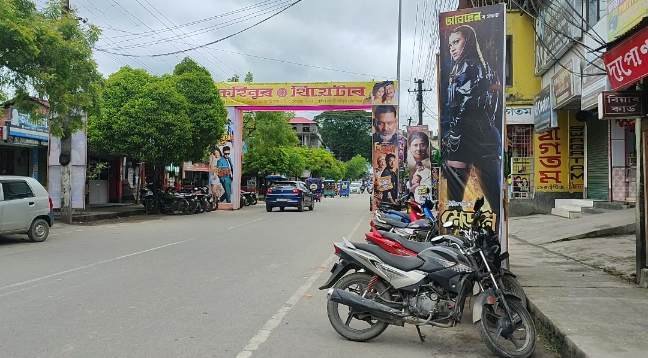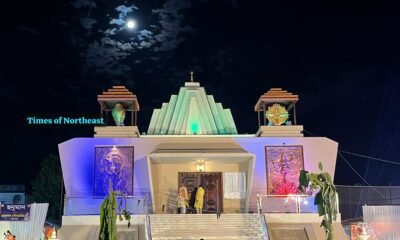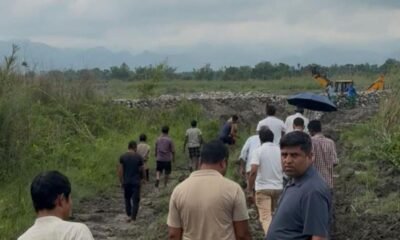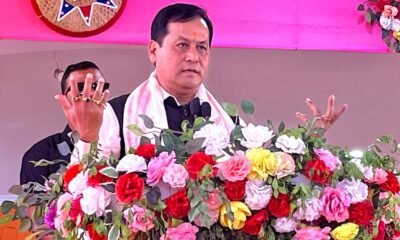Featured
Assam’s Mobile Theatre journey since 1960s

The mobile theatre of Assam, also known as Bhramyaman Theatre, is a unique and vibrant form of theatre that originated in the state of Assam, India where Achyut Lakhar gave birth to Mobile theatre in Pathsala town in the 1960s. Every year the theatre groups travel from place to place with their cast, crew, musicians, dancers and everything required to set the stage, to perform in villages, towns, and cities across Assam.

During the theatre season Pathsala town turned festivity where thousands of people gathered in one place to see plays of ‘Awahan Theatre’, ‘Kohinoor Theatre’, ‘Rajmukut Theatre’, ‘Rajlakhsmi Theatre’. It’s like a festival for the people. The plays often focus on social issues, family drama, mythology, and folklore, as well as contemporary topics like politics and corruption which the audience loves it.
The Theatre group continues to attract audiences on live stage without the use of special effects like green or blue screens, or 3D or 5D technology. During the show many actors injured by accident on live stage.
Earlier, plays like ‘Titanic’ attracted audience without a single drop of water on stage, and ‘Jurassic Park’, ‘Mary Kom’, ‘Mahabharat’ and ‘Ramayana’ also attracted audience.
The groups give employment scope to more than 5000 people. There are more than 30 mobile theatres in Assam, where more than 100 to 150 people work in every group.
Tapan Lahkar, producer of Kohinoor Theatre, reflected on the theatre’s legacy, saying, “Kohinoor Theatre has proudly completed 49 years. Every artist in our group puts in immense effort. In the past, we managed to make our play ‘Titanic’ a success without a single drop of water or any special effects—it was a significant challenge for my father. Similarly, our productions of ‘Jurassic Park,’ ‘Mahabharat,’ and ‘Ramayan’ captivated audiences long before they were ever seen on television.”
Prastuti Parashar, producer of Awahan Theatre, emphasized the cultural importance of mobile theatre, stating, “Mobile theatre has played a crucial role in promoting Assamese culture, language, and identity while providing both entertainment and social commentary to audiences across the state. Awahan Theatre is like family to me, and we are committed to giving our best to entertain our audience. We tackle stories about family and political issues, always with a focus on Assamese culture. We also need the continued support of the people.”
Dhruba Talukdar, producer of Rajlakshmi Theatre, shared his passion for the art, saying, “I hail from Pathsala town, the birthplace of mobile theatre, founded by Achyut Lahkar. Inspired by the plays I watched as a child, I always dreamed of opening my own theatre. I aim to spread positive messages through our productions, addressing issues like global warming, social concerns, politics, and corruption. I take risks to fulfill my dreams, and I don’t believe that OTT platforms can ever replace the unique experience of mobile theatre.”
Manas Kalita, producer of Rajmukut Theatre, highlighted the challenges faced by performers, noting, “Performing on a live stage is not easy. Many actors have been injured during shows, yet they continue to perform with dedication. Every actor and staff member works incredibly hard in mobile theatre.”
Finally, Giridhor Choudhury, a senior citizen from Bajali, expressed his deep connection to the tradition, saying, “Assam’s mobile theatre groups are an integral part of our culture and should live on forever. It’s an emotion for the Assamese people. Since 1963, mobile theatre has provided employment opportunities to many in Assam. Today, there are more than 30 mobile theatres in the state, each employing 100 to 150 people. In total, 4,000 to 5,000 individuals are engaged in this vibrant tradition.”
















